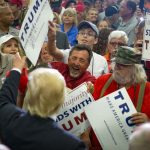 With the anti-immigrant rhetoric of Donald Trump during the last presidential election so visceral, it seems obvious that it would have fueled and normalized prejudice, new research from the University of California, Riverside, highlights just how prominent his impact was.
With the anti-immigrant rhetoric of Donald Trump during the last presidential election so visceral, it seems obvious that it would have fueled and normalized prejudice, new research from the University of California, Riverside, highlights just how prominent his impact was.
The researchers quizzed around 1,000 people in the spring of 2016 in a couple of waves. The first of these helped to gauge the political orientation of people alongside their demographic information. The participants were quizzed to explore their existing levels of prejudice via word associations, such as ‘intelligent’ and ‘lazy’ with Hispanics in America.
A second wave was then completed a week later, with participants asked to read one of five different articles produced by the research team. Each article was based upon real election material and was related to either immigration or campaign finance reform. The articles discussed the positions of Hillary Clinton, Jeb Bush or Donald Trump. Only a few of these articles contained examples of Trump’s racially inflammatory language, with a few of these also containing content about political elites either condoning or condemning his remarks.
Emboldened prejudice
After reading the article, the respondents read a vignette about a character and were asked to rate how acceptable the behavior of the character was.
* “Darren Smith is a middle manager at an accounting firm and has been working at the firm for nearly eight years. One part of Darren’s job is to supervise the new interns for the accounting firm. While Darren usually likes the interns, he does not like a new intern named Miguel. Darren regularly throws away Miguel’s leftover food in the break-room fridge, claiming that ‘Miguel’s food is greasy and smells up the fridge.'”
The aim behind the vignette was to depict a fairly mundane situation in which prejudice or discriminatory behavior is exhibited by an individual.
On a positive side, the majority of people regarded the behavior in the vignette as unacceptable, with just 9% regarding it as either neutral or acceptable. What was interesting, however, was that exposure to Trump’s racial rhetoric did seem to embolden more racist attitudes.
When people weren’t exposed to such rhetoric, the opposite appeared to occur, with people less likely to regard such discriminatory behavior as acceptable.
“However, we find that this ‘suppression effect’ slowly unravels and gives way to tolerance and acceptance of prejudiced behavior following exposure to racially inflammatory speech by a prominent political elite,” the researchers say.
Perhaps the most important finding from the research was that this emboldening effect was most pronounced in the texts where other political elites appeared to tacitly condone his remarks. By staying silent, they create the impression that this is normal and that previous norms of racial equality and tolerance were eroding. This then creates less pressure for people to uphold these norms.
“The emboldening effect of an elite like Donald Trump is most pronounced in a context where citizens are given signals that the political system tolerates prejudice by allowing candidates who engage in prejudiced speech to continue their campaigns without sanction,” the researchers conclude. “Last, we find that condemnation by other elites does little to suppress prejudice once it is activated.”